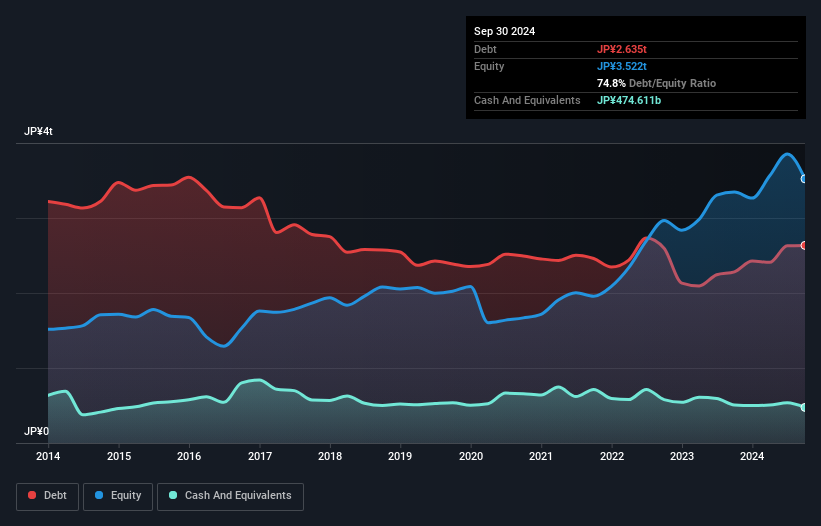
Warren Buffett famously said, 'Volatility is far from synonymous with risk.' So it might be obvious that you need to consider debt, when you think about how risky any given stock is, because too much debt can sink a company. We note that Marubeni Corporation (TSE:8002) does have debt on its balance sheet. But the more important question is: how much risk is that debt creating?
When Is Debt A Problem?
Generally speaking, debt only becomes a real problem when a company can't easily pay it off, either by raising capital or with its own cash flow. If things get really bad, the lenders can take control of the business. However, a more frequent (but still costly) occurrence is where a company must issue shares at bargain-basement prices, permanently diluting shareholders, just to shore up its balance sheet. Of course, plenty of companies use debt to fund growth, without any negative consequences. When we examine debt levels, we first consider both cash and debt levels, together.
Check out our latest analysis for Marubeni
What Is Marubeni's Debt?
As you can see below, at the end of September 2024, Marubeni had JP¥2.63t of debt, up from JP¥2.28t a year ago. Click the image for more detail. However, because it has a cash reserve of JP¥474.6b, its net debt is less, at about JP¥2.16t.

How Strong Is Marubeni's Balance Sheet?
According to the last reported balance sheet, Marubeni had liabilities of JP¥2.44t due within 12 months, and liabilities of JP¥2.62t due beyond 12 months. Offsetting these obligations, it had cash of JP¥474.6b as well as receivables valued at JP¥1.47t due within 12 months. So its liabilities total JP¥3.11t more than the combination of its cash and short-term receivables.
This deficit is considerable relative to its very significant market capitalization of JP¥3.94t, so it does suggest shareholders should keep an eye on Marubeni's use of debt. This suggests shareholders would be heavily diluted if the company needed to shore up its balance sheet in a hurry.
We use two main ratios to inform us about debt levels relative to earnings. The first is net debt divided by earnings before interest, tax, depreciation, and amortization (EBITDA), while the second is how many times its earnings before interest and tax (EBIT) covers its interest expense (or its interest cover, for short). This way, we consider both the absolute quantum of the debt, as well as the interest rates paid on it.
Marubeni has net debt to EBITDA of 4.9 suggesting it uses a fair bit of leverage to boost returns. But the high interest coverage of 8.6 suggests it can easily service that debt. Marubeni grew its EBIT by 5.0% in the last year. That's far from incredible but it is a good thing, when it comes to paying off debt. There's no doubt that we learn most about debt from the balance sheet. But ultimately the future profitability of the business will decide if Marubeni can strengthen its balance sheet over time. So if you're focused on the future you can check out this free report showing analyst profit forecasts.
Finally, a business needs free cash flow to pay off debt; accounting profits just don't cut it. So we clearly need to look at whether that EBIT is leading to corresponding free cash flow. Over the last three years, Marubeni recorded free cash flow worth a fulsome 97% of its EBIT, which is stronger than we'd usually expect. That puts it in a very strong position to pay down debt.
Our View
When it comes to the balance sheet, the standout positive for Marubeni was the fact that it seems able to convert EBIT to free cash flow confidently. However, our other observations weren't so heartening. To be specific, it seems about as good at managing its debt, based on its EBITDA, as wet socks are at keeping your feet warm. Looking at all this data makes us feel a little cautious about Marubeni's debt levels. While debt does have its upside in higher potential returns, we think shareholders should definitely consider how debt levels might make the stock more risky. There's no doubt that we learn most about debt from the balance sheet. But ultimately, every company can contain risks that exist outside of the balance sheet. Be aware that Marubeni is showing 2 warning signs in our investment analysis , and 1 of those is a bit unpleasant...
At the end of the day, it's often better to focus on companies that are free from net debt. You can access our special list of such companies (all with a track record of profit growth). It's free.
New: Manage All Your Stock Portfolios in One Place
We've created the ultimate portfolio companion for stock investors, and it's free.
• Connect an unlimited number of Portfolios and see your total in one currency
• Be alerted to new Warning Signs or Risks via email or mobile
• Track the Fair Value of your stocks
Have feedback on this article? Concerned about the content? Get in touch with us directly. Alternatively, email editorial-team (at) simplywallst.com.
This article by Simply Wall St is general in nature. We provide commentary based on historical data and analyst forecasts only using an unbiased methodology and our articles are not intended to be financial advice. It does not constitute a recommendation to buy or sell any stock, and does not take account of your objectives, or your financial situation. We aim to bring you long-term focused analysis driven by fundamental data. Note that our analysis may not factor in the latest price-sensitive company announcements or qualitative material. Simply Wall St has no position in any stocks mentioned.
About TSE:8002
Marubeni
Marubeni Corporation purchases, distributes, and markets industrial and consumer goods.
Established dividend payer and good value.
Similar Companies
Market Insights
Community Narratives



